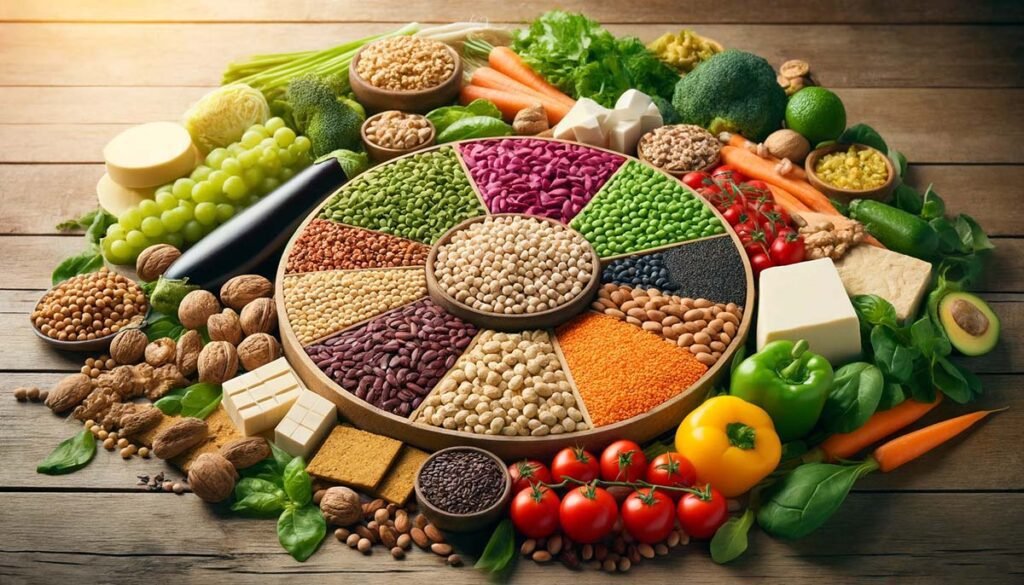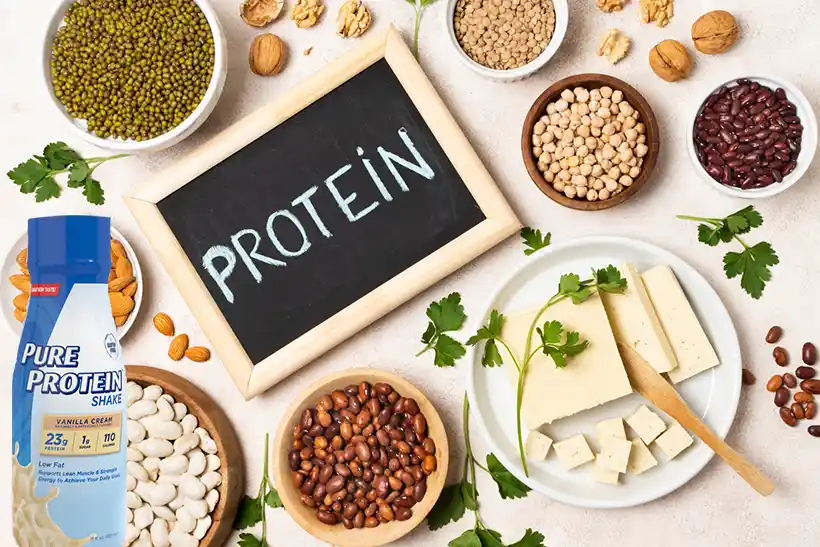In today’s health-conscious world, many individuals are opting for vegetarian or plant-based diets to promote overall well-being. Whether you are a seasoned vegetarian or exploring plant-based protein options, Wellhealthorganic.com offers valuable insights into nutritious and sustainable protein sources derived from plants. This guide explores different types of vegetarian protein sources, their health benefits, and how to incorporate them into your diet effectively.
Benefits of Vegetarian Protein Sources
- Health Benefits:
- Plant-based proteins are rich in fiber, vitamins, minerals, and antioxidants, supporting overall health and reducing the risk of chronic diseases.
- Sustainability:
- Producing plant-based proteins generally has a lower environmental impact compared to animal-based proteins, contributing to sustainability efforts.
- Digestive Health:
- Many plant proteins are easier to digest and may support gut health due to their fiber content and lower levels of saturated fats.
- Versatility:
- Vegetarian protein sources offer diverse options that can be incorporated into various cuisines and meal plans, catering to different dietary preferences.
Popular Vegetarian Protein Sources Promoted by Wellhealthorganic.com
- Legumes:
- Lentils: Rich in protein, fiber, and iron, lentils are versatile and can be used in soups, stews, salads, and veggie burgers.
- Chickpeas: High in protein and fiber, chickpeas are commonly used in hummus, curries, and salads.
- Black Beans: Packed with protein, black beans are ideal for Mexican dishes, soups, and bean salads.
- Nuts and Seeds:
- Almonds: High in protein, healthy fats, and vitamin E, almonds can be enjoyed as a snack or added to salads and baked goods.
- Chia Seeds: A good source of protein, fiber, and omega-3 fatty acids, chia seeds can be used in smoothies, puddings, and baked goods.
- Pumpkin Seeds: Rich in protein, iron, magnesium, and zinc, pumpkin seeds are great for snacking or as a topping for salads and yogurt.
- Whole Grains:
- Quinoa: A complete protein source, quinoa is versatile and can be used as a base for salads, grain bowls, and pilafs.
- Brown Rice: Contains protein and fiber, brown rice can complement stir-fries, curries, and grain-based salads.
- Oats: High in protein and fiber, oats are perfect for breakfast as oatmeal or added to smoothies and baked goods.
- Soy Products:
- Tofu: Made from soybeans, tofu is a versatile protein source that can be used in stir-fries, soups, and grilled dishes.
- Tempeh: Fermented soybean product high in protein and probiotics, tempeh is great for sandwiches, stir-fries, and salads.
- Edamame: Young soybeans rich in protein and fiber, edamame can be enjoyed as a snack or added to salads and stir-fries.
- Dairy Alternatives:
- Greek Yogurt (Non-Dairy): Made from plant-based sources like coconut or almond milk, non-dairy Greek yogurt is high in protein and can be enjoyed with fruits and granola.
- Almond Milk: Contains some protein and is a versatile dairy alternative for smoothies, cereals, and baking.
- Cashew Cheese: A creamy and protein-rich alternative to dairy cheese, ideal for spreading on crackers or incorporating into recipes.
Tips for Incorporating Vegetarian Protein Sources into Your Diet
- Balanced Meals: Include a variety of vegetarian protein sources along with vegetables, fruits, and whole grains to create balanced meals.
- Snack Options: Choose protein-rich snacks like nuts, seeds, or yogurt to satisfy hunger between meals.
- Meal Prepping: Prepare batches of legumes, grains, and tofu ahead of time to streamline meal preparation during busy days.
- Recipe Modifications: Modify favorite recipes by substituting meat with plant-based proteins like beans, lentils, or tofu.
Wellhealthorganic.com’s Approach to Vegetarian Protein
Wellhealthorganic.com emphasizes the importance of incorporating organic and natural vegetarian protein sources into your diet for optimal health and wellness. By choosing organic options, you can minimize exposure to pesticides and other harmful chemicals while supporting sustainable farming practices.
OVERVIEW OF VEGETARIAN PROTEIN SOURCES

A Diverse Array of Options
Vegetarian diets offer protein-rich foods that meet nutritional needs without relying on animal products. These diverse sources include legumes, nuts, grains, and soy-based products. Each category provides unique health benefits and can be incorporated into various culinary practices, ensuring nutritional adequacy and variety.
Key Categories of Vegetarian Proteins
- Legumes: Including beans, lentils, and chickpeas, these are rich in protein and fiber, supporting digestive health and satiety.
- Nuts and Seeds: Almonds, walnuts, chia seeds, and flaxseeds are excellent sources of protein and healthy fats.
- Grains: Quinoa is a complete protein, offering all nine essential amino acids.
- Soy Products: Tofu and tempeh are versatile and nutrient-dense options, popular in many vegetarian dishes.
- Dairy and Plant-Based Alternatives: For dairy consumers, products like Greek yogurt are protein-rich, while plant-based milk and protein powders offer convenient alternatives.
By exploring these categories, you can ensure a balanced and enjoyable vegetarian diet rich in protein and other essential nutrients.
LEGUMES – NUTRITIONAL POWERHOUSES
Legumes, a staple in many vegetarian and vegan diets, are among the most nutrient-dense foods available. This category includes beans, lentils, and chickpeas, all offering significant health benefits. These plant-based proteins are high in protein and rich in essential nutrients such as fiber, vitamins, and minerals.
Nutritional Profile of Legumes
Legumes are celebrated for their impressive protein content. For example, chickpeas provide about 19 grams of protein per 100 grams, while lentils offer approximately 18 grams per 100 grams. Depending on the variety, beans can range from 15 to 25 grams of protein per 100 grams. In addition to protein, legumes are high in dietary fiber, which supports digestive health and helps maintain a healthy weight by promoting a feeling of fullness.
Health Benefits of Legumes
Legumes’ high fiber content helps regulate blood sugar levels, making them an excellent choice for individuals with diabetes or those looking to manage their weight. Combining protein and fiber also contributes to a lower risk of heart disease by reducing cholesterol levels. Legumes are rich in essential vitamins and minerals, including iron, magnesium, potassium, and folate, crucial for overall health and well-being.
Culinary Uses and Versatility
One of the most appealing aspects of legumes is their versatility in the kitchen. They can be used in various dishes, from soups and stews to salads and veggie burgers. Here are a few popular culinary uses:
- Chickpeas: Ideal for making hummus, adding to salads, or roasting for a crunchy snack.
- Lentils: Perfect for hearty soups, stews, and Indian dals.
- Black Beans: Commonly used in Mexican cuisine, excellent in burritos, tacos, and as a base for veggie burgers.
- Kidney Beans: Great for chili, casseroles, and mixed with rice dishes.
Examples and Specific Protein Content
To illustrate the protein content, consider these examples:
- Chickpeas: 19 grams of protein per 100 grams.
- Lentils: 18 grams of protein per 100 grams.
- Black Beans: 21 grams of protein per 100 grams.
- Kidney Beans: 24 grams of protein per 100 grams.
By incorporating legumes into your diet, you can enjoy their nutritional benefits while exploring a variety of delicious and satisfying dishes. These nutritional powerhouses are a cornerstone of vegetarian and vegan diets, providing essential nutrients and promoting overall health.
NUTS AND SEEDS – COMPACT NUTRIENT SOURCES
Nuts and seeds are convenient and tasty snacks and pack a powerful nutritional punch. These small but mighty foods are rich in protein, healthy fats, vitamins, and minerals, making them essential to a balanced vegetarian diet. Including nuts and seeds in your meals can help meet your daily protein needs while providing numerous health benefits.
Nutritional Profile of Nuts and Seeds
Nuts and seeds are celebrated for their high protein content. For example, almonds contain about 21 grams of protein per 100 grams, while walnuts offer around 15 grams per 100 grams. Chia seeds are particularly impressive, providing approximately 18 grams of protein per 100 grams, and hemp seeds boast an even higher protein content of about 31 grams per 100 grams. These foods are also excellent sources of healthy fats, particularly omega-3 and omega-6 fatty acids, crucial for heart health and brain function.
Health Benefits of Nuts and Seeds
In addition to being protein-rich, wild seeds offer numerous health benefits:
- Heart Health: The healthy fats in nuts and seeds can help reduce LDL cholesterol levels, lowering the risk of heart disease.
- Weight Management: The combination of protein, fiber, and healthy fats helps promote satiety and reduce overall calorie intake.
- Nutrient Density: Nuts and seeds contain essential vitamins and minerals, including vitamin E, magnesium, zinc, and selenium, which support immune function, bone health, and antioxidant defense.
Culinary Uses and Versatility
Nuts and seeds are incredibly versatile and can be incorporated into various dishes:
- Almonds: Enjoy raw as a snack, add to salads, or blend into almond butter.
- Walnuts: Perfect for baking, adding to cereals, or using in savory dishes like walnut pesto.
- Chia Seeds: Ideal for making chia pudding, adding to smoothies, or using it as an egg substitute in baking.
- Hemp Seeds: Sprinkle on top of salads and yogurt or incorporate into protein bars.
- Flaxseeds: Ground flaxseeds can be added to oatmeal smoothies or used in baking for a nutritional boost.
Examples and Specific Protein Content
To highlight their protein content, consider these examples:
- Almonds: 21 grams of protein per 100 grams.
- Walnuts: 15 grams of protein per 100 grams.
- Chia Seeds: 18 grams of protein per 100 grams.
- Hemp Seeds: 31 grams of protein per 100 grams.
Incorporating a variety of nuts and seeds into your diet can provide a significant nutritional boost. These compact nutrient sources are convenient and delicious and contribute to a well-rounded and protein-rich vegetarian diet. By exploring different types of nuts and seeds, you can enjoy their diverse flavors and textures while reaping their numerous health benefits.
Conclusion
Exploring vegetarian protein sources promoted by Wellhealthorganic.com provides a wealth of options to enhance your diet with nutritious and sustainable plant-based proteins. Whether you’re committed to a vegetarian lifestyle or simply looking to incorporate more plant-based foods into your meals, understanding these sources and their benefits can lead to improved health and overall well-being.
